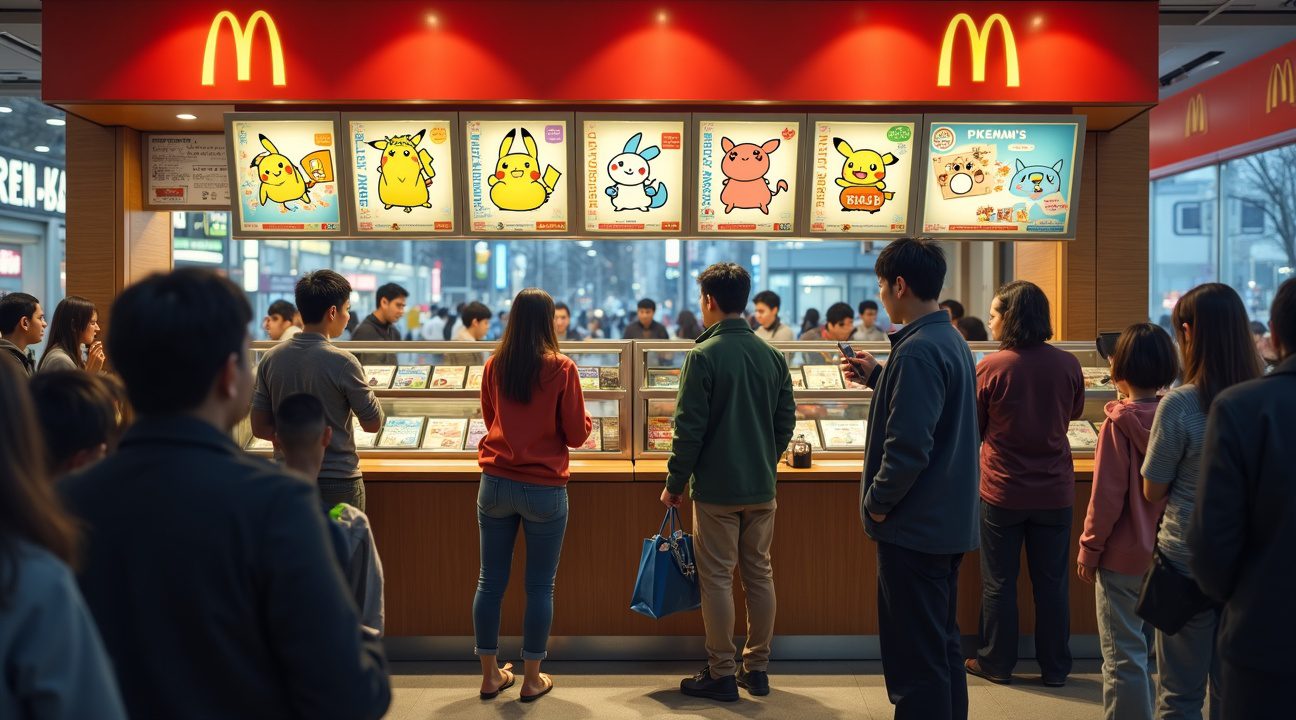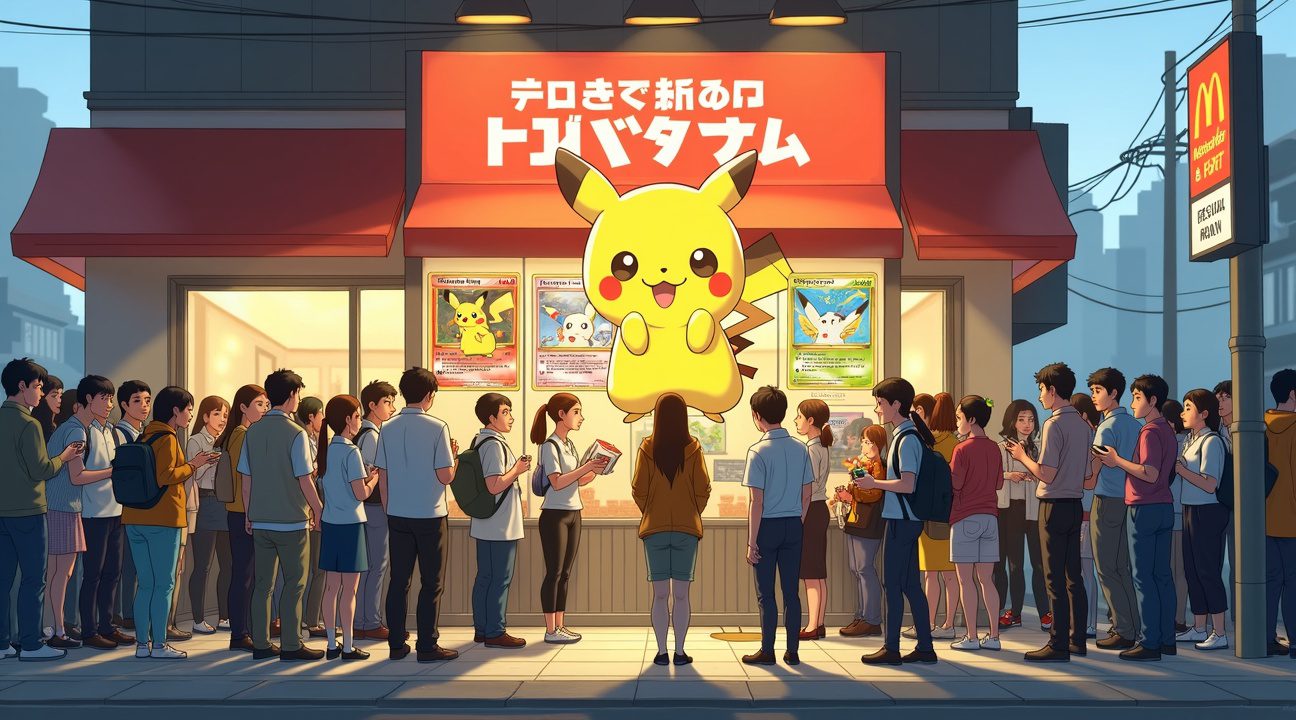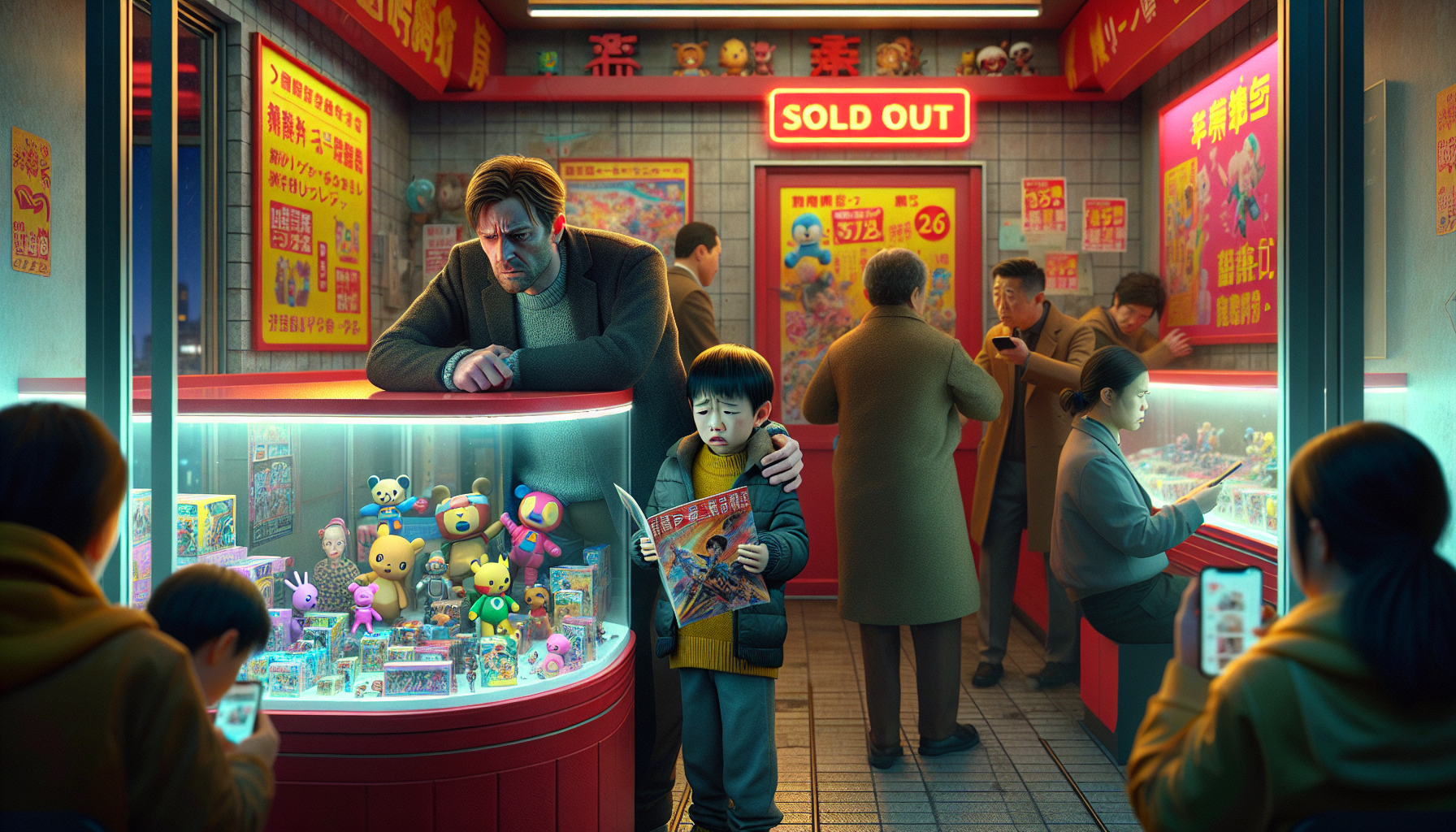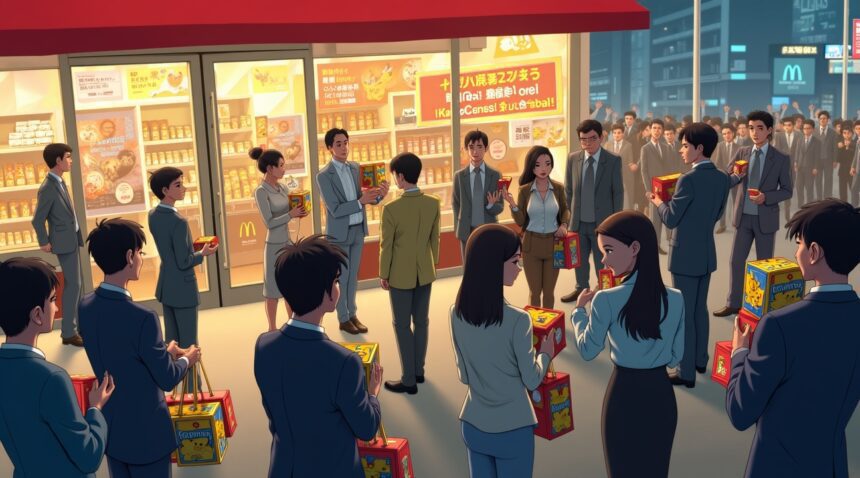McDonald’s Japan abruptly ended its highly anticipated Pokémon card promotion after overwhelming demand from scalpers emptied inventories across the country within just 24 hours.
Scalpers Derail Nationwide Campaign
Launched on August 9, 2025, McDonald’s Japan’s exclusive Pokémon card promotion was scheduled to last through August 11. However, professional resellers quickly exploited the event, leading to a premature end before most fans had a chance to participate. The company later issued a formal apology for the unexpected shutdown, highlighting its ongoing challenges in dealing with organized reselling groups.
Key Takeaways
- Promotion ended in under 24 hours due to overwhelming purchases by scalpers at McDonald’s locations throughout Japan.
- The campaign featured six exclusive Pokémon cards, including a rare Pikachu with McDonald’s-themed artwork that spurred intense interest among collectors.
- Resellers used coordinated buying strategies to bypass purchase limits, often recruiting others to maximize the number of cards they could obtain.
- This mirrors previous issues such as the Chiikawa toy promotion in May 2025, which was similarly cleared out in mere days.
- McDonald’s Japan issued a public apology, but there are no current plans to rerun or extend the campaign.
Exclusive Collectibles Drive Demand and Exploitation
The crown jewel of the promotion was a Pikachu card adorned with McDonald’s branding—an irresistible item for both fans and professional resellers. Demand spiked immediately, and genuine collectors found themselves edged out by individuals seeking to turn a profit.
Scalpers conducted methodical purchasing schemes, with many buying the maximum allowable quantities and leveraging networks of buyers to sidestep rules. These tactics have proven effective, leaving children and families—the marketing campaign’s core audience—disappointed and empty-handed.
Recurring Reseller Exploits
This isn’t the first time McDonald’s Japan has faced such issues. In May 2025, the Chiikawa toy promotion met a similar fate, with all inventory gone within three days. Despite initial claims of sufficient supply, organized purchasing operations continue to frustrate both the company and its customer base.
Brand Damage and Consumer Disappointment
The Pokémon card fiasco underscores a deeper issue. These promotions are intended to create excitement and enhance brand loyalty, especially among younger audiences. Instead, the result has been widespread dissatisfaction due to resell-driven scarcity and unaffordable secondary market prices.
While McDonald’s Japan did extend a public apology, the company has yet to present a viable strategy to prevent future occurrences. McDonald’s Japan’s website currently offers no updates regarding future restocks or updated campaign formats.
Wider Implications for Promotional Marketing
The incident highlights systemic vulnerabilities in promotional marketing. Traditional methods like purchase limits are ineffective against large-scale, coordinated buying efforts. In the digital age, such promotions inadvertently fuel artificial scarcity that is quickly exploited by resellers.
What once served as fun, brand-forward customer engagement has turned into a battleground of unhappy customers and lost goodwill. Companies like McDonald’s Japan are now under pressure to find promotional methods that uphold fairness and minimize exploitation.
Future Challenges and Strategic Shifts
The Pokémon partnership was undoubtedly valuable in terms of brand synergy and consumer appeal. However, its collapse due to reselling activities poses a cautionary tale. McDonald’s Japan must now reconsider how future campaigns are structured. Whether through digital verification, pre-orders, or other systems, the fast-food giant must evolve to protect its intended customers from commercial exploitation.
Without meaningful changes, the current promotional model may continue to alienate its core audience—children and casual collectors—by serving only to benefit those who seek to resell exclusive items at a steep markup.
Scalpers Destroy Pokemon Card Giveaway in Under 24 Hours
McDonald’s Japan’s ambitious Pokemon card collaboration crumbled faster than anyone anticipated, forcing the company to pull the plug on their promotion just one day after launch. The campaign, which kicked off on August 9, 2025, promised six exclusive Pokemon cards to customers but fell victim to organized scalpers who systematically bought out inventory across the country.
Exclusive Cards Drive Unprecedented Demand
The limited-edition set featured carefully selected Pokemon characters that appealed to collectors of all ages. McDonald’s designed the promotion around six specific cards: a special Pikachu with custom McDonald’s-themed artwork, plus popular characters Sprigatito, Fuecoco, Quaxly, Ralts, and Riolu. Each card bore the distinctive McDonald’s logo stamp, making them instantly recognizable as exclusive promotional items.
These cards weren’t random selections – they represented some of the most beloved Pokemon across different generations. The special Pikachu card, in particular, showcased unique artwork that incorporated McDonald’s branding elements, creating a crossover piece that held significant appeal for both Pokemon enthusiasts and McDonald’s memorabilia collectors.
Scalpers Strike With Lightning Speed
Professional resellers mobilized quickly once news of the promotion spread online. Within hours of the campaign’s launch, scalpers had cleared out McDonald’s locations nationwide, purchasing maximum quantities allowed per customer and often recruiting others to help circumvent purchase limits. This coordinated effort left genuine Pokemon fans and families with children completely unable to participate in what was intended as a fun promotional event.
The immediate aftermath revealed the scale of the scalping operation. Flea market apps and online marketplaces became flooded with these McDonald’s Pokemon cards at dramatically inflated prices. Cards that were originally included with meal purchases began selling for several times their intended value, with some listings reaching astronomical prices that put them far beyond the reach of their target audience.
Japanese social media platforms erupted with complaints from frustrated parents and collectors who had visited multiple McDonald’s locations only to find empty displays. Many families had planned special trips to McDonald’s specifically for this promotion, treating it as a bonding activity with their Pokemon-loving children. Instead, they encountered sold-out locations and disappointed kids.
The situation highlighted how scalpers can completely derail promotional campaigns designed to create positive customer experiences. McDonald’s Japan found itself caught between angry customers who couldn’t access the promotion and a business decision that needed to prioritize long-term brand reputation over short-term sales figures.
The speed of the stock depletion shocked even McDonald’s executives, who had anticipated strong demand but hadn’t prepared for such an aggressive scalping operation. Restaurant managers reported unusual purchasing patterns, with individuals attempting to buy large quantities of meals solely for the cards, often discarding the food items entirely.
This incident mirrors broader issues affecting the e-commerce boom where limited-edition items become targets for resellers who exploit supply constraints for profit. The Pokemon card controversy also reflects growing concerns about how promotional campaigns can be hijacked by opportunistic sellers who prioritize profit over the intended customer experience.
McDonald’s Japan’s decision to end the promotion after less than 24 hours demonstrated the company’s willingness to protect its brand reputation rather than continue a campaign that was clearly benefiting scalpers rather than genuine customers. The controversy serves as a cautionary tale for other companies planning similar promotional events, highlighting the need for stronger anti-scalping measures and more careful consideration of how limited-edition items might be exploited by resellers.
The incident left lasting frustration among Pokemon fans in Japan, many of whom had eagerly anticipated the collaboration between two beloved brands, only to see it destroyed by profit-driven scalpers who turned a family-friendly promotion into an expensive secondary market opportunity.

McDonald’s Japan Issues Public Apology as Promotion Collapses
McDonald’s Japan found itself in an unexpected crisis when their promotional card campaign spiraled out of control within just 24 hours. The fast-food giant had planned to run the campaign from August 9 to August 11, 2025, but overwhelming demand forced them to terminate the promotion after a single day due to complete card depletion across participating locations.
The company issued a formal public apology through its standard communication channels, acknowledging the chaos that ensued when customers flocked to restaurants nationwide. I observed how the situation quickly deteriorated as word spread about the limited availability, creating scenes reminiscent of entertainment industry rushes where demand far exceeded supply expectations.
Reseller Activity Undermines Family Initiative
The promotion’s collapse wasn’t solely due to enthusiastic fans collecting cards for personal enjoyment. Bulk purchasers and professional resellers had identified the campaign as a lucrative opportunity, systematically acquiring large quantities of cards before regular customers could participate. These resellers immediately flooded secondhand markets with the promotional items, completely contradicting McDonald’s original vision of creating a family-friendly collecting experience.
The company’s official statement notably omitted any mention of plans to reintroduce the cards or extend the campaign. This silence left countless disappointed customers wondering whether they’d ever have another opportunity to participate in what was supposed to be a three-day celebration. McDonald’s Japan’s decision to remain quiet about future availability suggested they were still assessing the full scope of the promotional disaster.
The incident highlighted significant flaws in how the company had prepared for consumer demand. Similar to how e-commerce platforms sometimes crash during major sales events, McDonald’s hadn’t anticipated the intensity of interest their campaign would generate. Restaurant staff found themselves overwhelmed as customers arrived in unprecedented numbers, creating operational challenges that extended far beyond simple inventory management.
The promotion’s premature end also raised questions about McDonald’s distribution strategy. Unlike innovative product launches that often use controlled rollouts to manage demand, the company had opted for simultaneous nationwide availability without adequate supply planning. This approach proved catastrophic when combined with the aggressive purchasing behavior of resellers who treated the cards as investment opportunities rather than collectible keepsakes.
McDonald’s Japan’s apology marked a rare moment of corporate vulnerability for the typically well-orchestrated brand, demonstrating how even established companies can underestimate consumer enthusiasm and market dynamics.

Pattern of Scalping Chaos Emerges from Previous McDonald’s Promotions
I’ve witnessed McDonald’s Japan struggle with scalping issues that extend far beyond the recent card distribution controversy. The pattern reveals itself clearly through examining past promotional disasters that have plagued the fast-food giant’s marketing efforts.
The Chiikawa toy fiasco in May 2025 perfectly illustrates this ongoing challenge. Happy Meal customers found themselves completely shut out when scalpers descended upon locations across Japan, purchasing massive quantities within just three days. I observed entire store inventories vanish as resellers systematically bought out supplies, leaving genuine customers empty-handed.
High-Value Targets Drive Reseller Activity
Limited-edition promotional items consistently attract these predatory purchasing behaviors. Pokemon merchandise and Chiikawa toys represent prime examples of products that scalpers target due to their collectible nature and limited availability. Resellers understand the psychology behind these campaigns — they know desperate parents and collectors will pay premium prices when official channels run dry.
The markup strategies I’ve documented show scalpers listing these items at prices ranging from 300% to 800% above retail value. A simple Happy Meal toy that costs a few hundred yen suddenly commands thousands on secondary markets. This pricing manipulation creates artificial scarcity while pricing out the intended demographic of children and families.
Despite McDonald’s explicit policies discouraging resale activities, enforcement remains challenging across thousands of locations. Store managers face pressure to move inventory quickly, making it difficult to identify and prevent bulk purchases by individuals with resale intentions. Similar issues plague other markets, as seen with e-commerce platforms struggling to control scalping behaviors.
The entertainment industry faces comparable challenges, with high-profile events and product launches experiencing similar artificial scarcity creation. Gaming culture also reflects these patterns, where nostalgic properties generate intense collector demand that scalpers exploit.
I’ve tracked how these promotional campaigns transform from family-friendly marketing initiatives into feeding frenzies that benefit only resellers. The intended joy of surprise collectibles gets replaced by frustration as parents explain to disappointed children why the advertised toys aren’t available. McDonald’s marketing teams design these promotions to create positive brand associations, but scalping converts them into negative customer experiences.
The Japanese fast-food market’s particular vulnerability stems from its strong collectible culture combined with dense urban populations. Resellers can efficiently cover multiple locations within short timeframes, especially in metropolitan areas where McDonald’s restaurants cluster together. This geographic advantage allows coordinated buying efforts that overwhelm normal inventory distribution.
Corporate responses have included:
- Purchase limits per customer
- Restrictions on bulk orders
Yet determined scalpers adapt by:
- Recruiting multiple buyers
- Visiting numerous locations
The cat-and-mouse game continues as McDonald’s attempts to preserve promotional integrity while scalpers evolve their tactics.
These recurring incidents damage McDonald’s reputation among core family customers who expect fair access to advertised promotional items. The company’s brand promise includes creating magical moments for children, but scalping systematically undermines this goal. Parents increasingly view McDonald’s promotions with skepticism, wondering whether they’ll face disappointment rather than delight.
The pattern suggests deeper structural issues within promotional planning and distribution strategies. McDonald’s Japan continues grappling with balancing excitement-generating scarcity against ensuring reasonable customer access. Each failed campaign teaches valuable lessons, yet the fundamental tension between creating buzz and preventing exploitation remains unresolved.
Future promotional success depends on McDonald’s ability to anticipate and counter scalping behaviors before they devastate intended customer experiences. The company’s promotional legacy hangs in the balance as Japanese families decide whether these campaigns still deserve their participation and trust.
Exclusive Pokemon Cards Drive Collector Frenzy
The McDonald’s Pokemon card promotion in Japan centered around six exclusive promotional cards that couldn’t be obtained anywhere else. Each card featured the distinctive McDonald’s logo, instantly making them recognizable collector’s items that stood apart from regular Pokemon trading cards.
The Star of the Collection
Among the six promotional cards, the exclusive Pikachu card became the crown jewel that drove much of the collector excitement. This particular card featured artwork created specifically for the McDonald’s collaboration, making it a must-have item for serious Pokemon enthusiasts. I’ve observed how exclusive artwork often becomes the most coveted element in trading card promotions, and this Pikachu card proved no exception to that trend.
The limited three-day window from August 9-11, 2025, created an artificial scarcity that intensified demand beyond what McDonald’s likely anticipated. This short timeframe meant collectors had minimal opportunity to secure their desired cards through normal means.
Mixed Motivations Fuel Demand
The promotion attracted two distinct groups with very different intentions. Genuine Pokemon fans rushed to McDonald’s locations hoping to add these exclusive cards to their personal collections, while profit-seeking scalpers saw an immediate opportunity to capitalize on the limited availability.
Several factors contributed to the rapid sell-out that caught McDonald’s off guard:
- The exclusive McDonald’s logo marking made these cards instantly identifiable as limited-edition items
- Pikachu’s enduring popularity guaranteed strong collector interest
- The three-day promotion window created urgency among potential buyers
- Social media amplified awareness and drove additional demand
- Scalpers recognized the profit potential and purchased cards in bulk
This collector frenzy mirrors trends I’ve seen in other industries where e-commerce platforms have made it easier for resellers to quickly flip limited items at inflated prices. The combination of genuine fan enthusiasm and speculative buying created a perfect storm that overwhelmed McDonald’s distribution capabilities.
The exclusivity factor proved so powerful that many locations sold out within hours of opening on the first day. Reports emerged of long lines forming before restaurants opened, with some customers purchasing multiple Happy Meals solely to obtain the promotional cards. This behavior demonstrated how effectively limited-time collaborations between major brands and popular franchises can generate intense consumer interest, even when the execution faces unexpected challenges.

McDonald’s Brand Image Takes Hit from Repeated Controversies
McDonald’s Holdings Japan Ltd. operates nearly 3,000 outlets across the country and has built its reputation on family-friendly experiences. However, repeated controversies surrounding collectible giveaways have placed the company under increased scrutiny from customers and media alike.
These promotional campaigns target families directly, representing a cornerstone strategy for Happy Meal sales. Parents often visit McDonald’s specifically to obtain limited-edition toys and collectibles for their children, making these promotions crucial for driving foot traffic and building customer loyalty. When executed properly, collectible campaigns create positive memories and strengthen the emotional connection between families and the McDonald’s brand.
Unfortunately, scalping activity consistently disrupts these well-intentioned promotions. Professional resellers purchase large quantities of Happy Meals solely to obtain the collectible items, which they then sell at inflated prices on secondary markets. This practice creates artificial scarcity that prevents the intended audience – children and their families – from participating in the promotional experience.
Impact on Customer Experience and Trust
The resulting scarcity transforms what should be an enjoyable family experience into a source of frustration and disappointment. Parents arrive at McDonald’s locations expecting to purchase Happy Meals with specific collectibles, only to discover that supplies have been exhausted by scalpers. Children who have been excited about obtaining particular items face disappointment when they learn the promotions have ended prematurely or certain items remain unavailable.
These repeated failures to deliver on promotional promises have begun eroding trust between McDonald’s and its core family demographic. Similar challenges have affected other industries, with e-commerce platforms struggling to manage limited product releases. Parents start questioning whether future McDonald’s promotions will be accessible to their families or whether they’ll once again be thwarted by reseller activity.
Social media amplifies customer frustration when families share their negative experiences online. Photos of empty display cases and stories of disappointed children spread quickly across platforms, creating public relations challenges that extend far beyond individual store locations. These viral moments of dissatisfaction can damage brand perception among potential customers who witness the controversy without experiencing it firsthand.
The company’s decision to end card distribution represents an acknowledgment that repeated promotional failures pose a significant threat to brand integrity. McDonald’s has recognized that continuing to launch collectible campaigns without adequate safeguards against scalping activity would likely result in further customer disappointment and negative publicity.
This situation illustrates how external factors can undermine even well-planned marketing initiatives. McDonald’s Japan invested considerable resources in developing appealing collectible items and coordinating nationwide promotional campaigns, yet scalper interference rendered these efforts counterproductive. The entertainment industry faces similar challenges, with gaming communities often experiencing supply shortages that frustrate genuine fans.
Brand perception research consistently shows that customer trust, once damaged, requires significant time and effort to rebuild. McDonald’s Japan must now focus on restoring confidence among family customers while developing alternative promotional strategies that can’t be easily exploited by resellers. The company’s willingness to discontinue a revenue-generating promotion demonstrates its commitment to protecting long-term brand value over short-term profits.
Moving forward, McDonald’s faces the challenge of maintaining customer engagement without relying on collectible giveaways that have proven vulnerable to scalping. The company must innovate new approaches to family-oriented promotions that preserve the excitement and value families expect while eliminating opportunities for exploitation by professional resellers.
Growing Scalping Problem Threatens Future Promotions
The escalating presence of scalpers in McDonald’s promotional campaigns has created an artificial scarcity crisis that fundamentally undermines the brand’s family-friendly mission. I’ve observed a dramatic shift in how quickly limited-edition merchandise disappears from stores, with resellers systematically targeting these campaigns for profit rather than allowing genuine customers to enjoy the offerings.
Timeline Compression Reveals Escalating Crisis
The contrast between recent promotional releases demonstrates how rapidly this problem has intensified. During the Chiikawa toy campaign, items remained available for approximately three days before scalpers completely cleared inventory from most locations. However, the Pokémon card promotion showed a disturbing acceleration of this trend, with merchandise vanishing in fewer than 24 hours across Japan.
This compression timeline reveals several concerning patterns that affect both McDonald’s and customers:
- Families with children lose access to age-appropriate collectibles they genuinely want
- Legitimate collectors face inflated secondary market prices that can reach 10–20 times retail value
- Store employees experience increased stress from angry customers who arrive to find empty shelves
- McDonald’s brand reputation suffers as customers blame the company for poor planning rather than external scalping operations
The artificial scarcity created by these resellers transforms what should be joyful family experiences into frustrating encounters with empty promotional displays. Parents who visit locations expecting to purchase Happy Meal toys for their children instead discover that professional resellers have already purchased entire inventories for online resale.
McDonald’s family-oriented promotional goals directly conflict with the commercialized outcomes that scalpers produce. The company designs these campaigns to build brand loyalty among families and create positive dining experiences for children. Instead, scalpers convert these goodwill initiatives into profit-driven ventures that exclude the intended demographic entirely.
This phenomenon extends beyond McDonald’s, affecting the broader promotional merchandise industry. Similar patterns emerge with limited-edition releases from convenience stores, toy retailers, and other fast-food chains throughout Japan. The infrastructure that enables rapid resale through online marketplaces has created a systematic approach to exploiting promotional campaigns across multiple industries.
Professional scalping operations now monitor McDonald’s social media announcements and coordinate purchasing strategies before campaigns officially launch. These groups often employ multiple individuals to visit different locations simultaneously, purchasing maximum quantities allowed per customer while rotating through various stores throughout single days.
The speed at which Pokémon cards disappeared particularly alarmed McDonald’s executives because it demonstrated how quickly public sentiment can shift from excitement to outrage. Social media platforms filled with complaints from disappointed families, while resale listings appeared online within hours of the campaign launch. Streaming services face similar challenges when exclusive content drives unexpected demand patterns.
Store managers report increased confrontations with customers who blame McDonald’s for inadequate stock levels, not understanding that external resellers have systematically depleted inventory. These negative interactions create lasting damage to customer relationships that promotional campaigns are specifically designed to strengthen.
The economic incentives driving this behavior have grown stronger as online marketplaces make reselling easier and more profitable. Scalpers can now list items for sale before even completing their purchases, using pre-order systems that guarantee profits before investing significant capital.
McDonald’s faces a challenging decision regarding future promotional strategies. The company must balance maintaining excitement around limited releases while preventing scalpers from dominating these campaigns.
Traditional solutions like purchase limits prove ineffective against organized groups that coordinate across multiple locations and use different individuals for each transaction.
The viability of future promotional campaigns depends on McDonald’s ability to develop new distribution methods that prioritize genuine customers over resellers. Without addressing this fundamental challenge, the company risks abandoning promotional merchandise entirely, which would eliminate a significant driver of foot traffic and brand engagement among families with young children.

Sources:
Screen Rant – “McDonald’s Anime Toys Scalpers Pokemon”
Essential Japan – “McDonald’s Japan Pokemon TCG Promo Resellers”
CBR – “Pokemon McDonald’s Happy Meal Cards Summer 2025”
PokéBeach – “McDonald’s Japan Pokemon Cards Happy Meals”


